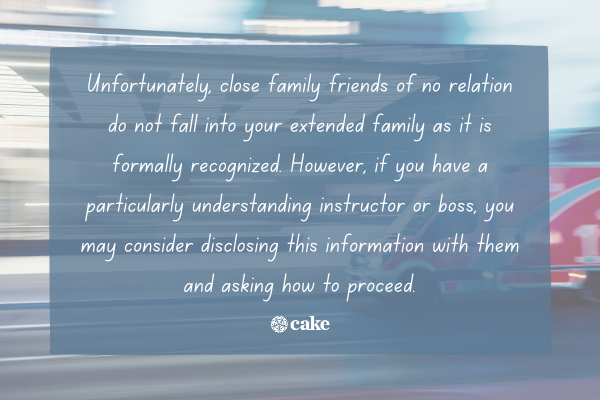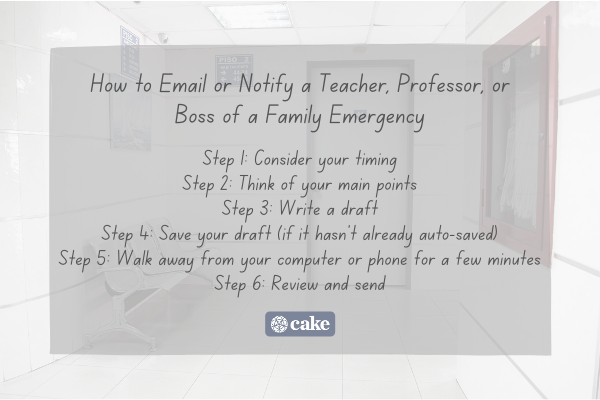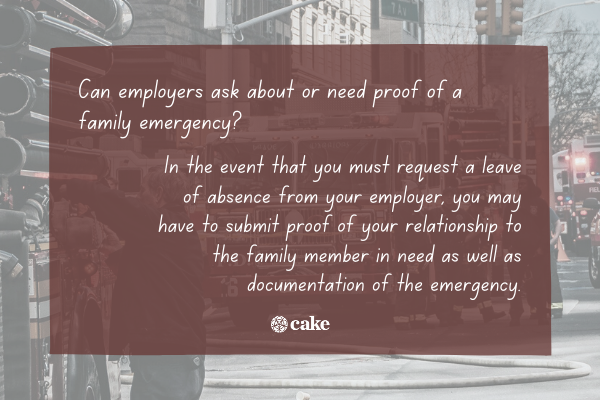How to Respond When Someone Has a Family Emergency
Cake values integrity and transparency. We follow a strict editorial process to provide you with the best content possible. We also may earn commission from purchases made through affiliate links. As an Amazon Associate, we earn from qualifying purchases. Learn more in our affiliate disclosure.
When a family emergency occurs, your first instinct may be to drop everything and prioritize your family members' needs. In some situations, it's the only available solution — and that could mean taking time away from other obligations.
Jump ahead to these sections:
- What Qualifies as a Family Emergency for Work or School
- How to Email or Notify a Teacher, Professor, or Boss of a Family Emergency
- Family Emergency FAQs
But what constitutes a family emergency, and how does your work or school define it? Here's what you need to know.
What Qualifies as a Family Emergency for Work or School

Whether you're currently going through a family emergency or you're thinking proactively, carefully consider who's a part of your family. It may seem obvious to you, but sometimes the closest to us aren't recognized by others as "real" family members.
Who's in your immediate family?
Your workplace or school may only grant leave or support for emergencies in your immediate family. Your immediate family is made up of your:
- Spouse or domestic partner
- Parents or legal guardian
- Grandparents
- Children
- Grandchildren
- Siblings
- Mother- and father-in-law
- Brother- and sister-in-law
- Daughter- and son-in-law
- Adopted, half, and stepfamily members
Who's in your extended family?
Your work or school may offer leave and support for your extended family as well. Your extended family is made up of:
- Aunts and uncles
- Great-aunts and uncles (and so on)
- Cousins
Unfortunately, close family friends of no relation do not fall into your extended family as it is formally recognized. However, if you have a particularly understanding instructor or boss, you may consider disclosing this information with them and asking how to proceed.
It may be wise to use paid time off or work on your assignments remotely while you provide support to loved ones.
Types of family emergencies that should excuse you from work or school
Every family has its own unique dynamic and may have different ideas about what constitutes a family emergency. Environmental danger or death are the big ones.
What constitutes a family emergency for health or medical reasons is outlined by the Family and Medical Leave Act (FMLA) . The FMLA applies to all public agencies, all public and private elementary and secondary schools, and companies with 50 or more employees.
Employers operating under the FMLA must provide an eligible employee with up to 12 weeks of unpaid leave each year for family emergencies. Whether emergent or ongoing, family emergencies include the following:
- The birth and care of the newborn child of an employee.
- Adoption or foster care of a child of an employee.
- To care for an immediate family member (such as a spouse, child, or parent) with a serious health condition.
- To take medical leave when the employee is unable to work because of a serious health condition.
- A car accident or similar accident of an immediate family member or another family member in your care
- A death or the funeral of an immediate or extended family member
- A natural disaster or other external danger that puts a family member's life or livelihood at risk
- A threat of other emotional or physical damage
- Anything else that may cause trauma or detriment to a family member
You may choose to request a leave of absence, use paid time off, or even switch to remote work to deal with the above circumstances, depending on your state, school, or work policies.
Post-loss tip:If you are the executor for a deceased loved one after a sudden death, the emotional and technical aspects of handling their unfinished business can be overwhelming without a way to organize your process. We have a post-loss checklist that will help you ensure that your loved one's family, estate, and other affairs are taken care of.
How to Email or Notify a Teacher, Professor, or Boss of a Family Emergency

When emailing a teacher, professor, or boss about a family emergency, your exact process may differ. However, if formal emails are a rare thing for you, you may want to consider following the steps below.
The more professional and mindful you sound, the more respect and support you'll likely receive. Keep in mind the details you need to share with the person you're contacting.
It may also be wise to ask these individuals about their policies for making up work and meeting other deadlines that you may miss.
Step 1: Consider your timing
Since you're dealing with a family emergency, it's likely that you think you should email your teacher, professor, or boss as soon as possible. While you're not wrong, you should consider what may be going on in that person's schedule at the time.
Is it a weekend? Does your teacher, professor, or boss not check their email often? Perhaps you can reach this person via a personal email address or even send a text, depending on your relationship. If the family emergency will impact your attendance for the following school or workday, this is permissible.
You may also choose to call and leave a voicemail at your boss or professor's office.
Step 2: Think of your main points
What are the key points that you have to relay to your teacher, professor, or boss? Is there any sort of "proof," such as a doctor's note, that you think it would be wise to include? It's understandable that it may be difficult to think carefully or logically during this time.
However, your superiors are more likely to work with you if you provide them with the necessary details and go about the matter professionally rather than emotionally. You should think about addressing the following points, depending on the details of your family emergency:
- When do you foresee yourself being absent?
- Have you delegated work to your peers or coworkers?
- Are you currently working on any projects that are considered urgent?
- Are you missing any meetings or other deadlines?
- Do you plan to be available at all via phone, text, or email while you're away?
- What details of the emergency should you share (it's an immediate family member, what happened, etc.)?
- What sort of bereavement leave is available?
Step 3: Write a draft
Now that you have either typed or made mental notes of the pertinent details, you're more prepared to draft an email. It doesn't have to be a novel, but the more specific and composed you sound, the easier it will be for even the least understanding teachers, professors, or bosses to cut you some slack.
This is a good point to think about if you should copy any other superiors or colleagues, such as counselors or human resources (HR) representatives or she shouldn't greet your message with respect and support.
Reread your draft and decide whether there's anything missing or if there's anything else you should share. This is also a good time to look for spelling or grammatical errors.
Step 4: Save your draft (if it hasn't already auto-saved)
One of the most important steps is to save your draft, especially if you work on an email platform that doesn't auto-save drafts.
The worst thing that could happen is that you'd have to write the email all over again. But it's likely that you'd prefer not to do so, especially considering the topic at hand.
Step 5: Walk away from your computer or phone for a few minutes
You have a saved draft. It's time to walk away from your computer, phone, or another device for a few minutes. Do something else.
Think about something else. Play with your dog or cat. Come back to your draft with fresh eyes.
Step 6: Review and send
It's time to reread your email and hit send. That being said, you don't have to follow all of the above steps if they seem too extensive. However, when dealing with a matter as serious as a family emergency, it's better to be safe and well-written than sorry.
Some teachers, professors, and bosses have very little patience when it comes to communication-related errors — don't fall victim to this.
Family Emergency FAQs

There are several frequently asked questions you might wonder about. During such a stressful time, there may be a lot of unknowns and the answers may depend on your unique situation. Perhaps the following can give you some peace of mind or at least a greater understanding of what's going on or how to explain your situation to others.
Can you get fired or penalized for having a family emergency?
Getting fired or penalized for a family emergency is horrible to consider, but it is possible. Some employers do not provide adequate support to individuals going through said emergencies. Firings or penalties may not even be based on a personal decision against you. It may, unfortunately, be due to a lack of funding, understaffing, or corporate policy.
However, you should also take note of how you can be covered by the FMLA — family members, that is, not girlfriends or fiancés, for example. Employers of less than 50 employees are not required to follow the FMLA and may not offer supplemental support.
In the event that you're fired and you still have a decent relationship with your former employer, you may consider at least asking for a letter of reference if you must leave the company. However, there's nothing wrong with asking for a second chance if there are no ill feelings.
On the other hand, if you suspect you were wrongfully terminated, you can contest for benefits from your employer.
Can employers ask about or need proof of a family emergency?
In the event that you must request a leave of absence from your employer, you may have to submit proof of your relationship to the family member in need as well as documentation of the emergency. This may include medical documents, doctor's notes, or any other official forms.
It's also common for institutions to require documentation for family emergencies. This may include notes that you can acquire from a doctor or other care professional. In the event of a death or other emergency, this may include memorial pamphlets, obituaries, news clips, formal claims, or military correspondence.
How do you respond to someone if they're saying they're having a family emergency?
When someone says they're dealing with a family emergency — and you have no reason to believe the individual would lie — support is the most important thing to offer. Tell the person that you're sorry he or she has to go through this and that you'll keep his or her family in your thoughts or prayers. Genuine well-wishes are never the wrong thing to say.
If the person didn't give details that you need answers to, it wouldn't be rude to ask for clarification. Just be advised that he or she may not answer right away. You should also offer whatever additional support you're authorized to give, such as approved leave or that you can adjust his or her schedule and push assignments, meetings, exams, and the like.
You should also ask if there's any other way you can help — if you feel comfortable doing so.
Things Happen
As you deal with family emergencies, it'll benefit you to understand what you're dealing with and what avenues of support are available to you. Dealing with loss, tragedies, or having to travel to provide support to your family can take a toll. Though work and school are important, they are arguably temporary.
Your family and your loved ones have been there since the beginning and will be there at the end of your life, too. Be sure to know your planning options as you deal with each emergency.
If you're looking for more ways to stay prepared, read our guides on how to create an emergency contact list and what to put on your medical ID bracelet.
Sources
- "Family and Medical Leave (FMLA)." U.S. Department of Labor. www.dol.gov/general/topic/benefits-leave/fmla
- "Pay and Leave: Leave Administration. Sick Leave for Family Care or Bereavement Purposes." U.S. Office of Personnel Management. www.opm.gov/policy-data-oversight/pay-leave/leave-administration/fact-sheets/sick-leave-for-family-care-or-bereavement-purposes/
How to Respond When Someone Has a Family Emergency
Source: https://www.joincake.com/blog/family-emergency/
0 Response to "How to Respond When Someone Has a Family Emergency"
Post a Comment